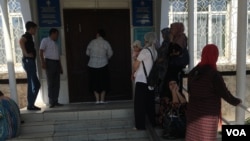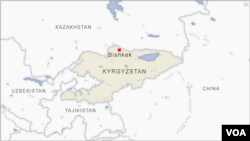Kyrgyzstan President Sadyr Japarov must decide by April 14 whether to sign a controversial law modeled on Russia's "foreign agents law" over the objections of nonprofit groups who say it will stigmatize them and create unnecessary bureaucratic hurdles.
The nation's Parliament gave third and final approval to the legislation on March 14 with overwhelming support after 64 of the 90 deputies put their signatures to the draft bill. Witnesses said passage occurred without debate and took just seven minutes.
The move comes amid international concern that authorities in Kyrgyzstan, a mountainous country of 7 million people, have been curtailing citizens' freedoms and taking increasingly harsh measures against political dissent.
In October 2022, authorities jailed 27 civil society activists on charges of fomenting unrest after they opposed a controversial border deal with Uzbekistan. In 2023, the Kyrgyz government closed several independent media outlets and jailed Adahan Madumarov, a member of Parliament and a prominent government critic.
Freedom House, in its 2023 report on the state of democracy titled Nations in Transit, categorized Kyrgyzstan as a "consolidated authoritarian regime."
The latest legislation was initiated in early 2022 by a dozen MPs associated with Ata-Jurt Kyrgyzstan, a pro-government party that dominates Parliament. Nadira Narmatova, one of the MPs who wrote the draft law, acknowledged at the time that it was modeled on the 2012 Russian bill dubbed the "foreign agent law."
She also said that "until we force some entities to acquire the status of foreign agents, there will be no stability in our country."
Since becoming an MP in 2021, Narmatova has gained a reputation as a vociferous critic of "Western ideology," particularly its tolerance for LGBTQ and women's rights.
A parliamentary press release following passage of the bill on March 14 said the law "was developed to ensure the transparency of non-profit organizations, particularly those financed from abroad."
The law says that any organization receiving foreign funding must register as a "foreign representative." Another provision gives the Ministry of Justice, which would implement the law, the authority to conduct unscheduled inspections and audits of the documentation of nonprofit organizations.
According to the Kyrgyz government, there are more than 18,000 nonprofit organizations in Kyrgyzstan.
Critics say the draft law creates unnecessary bureaucratic hurdles and can lead to the stigmatization and discrediting of civil society in public eyes.
Nonprofit organizations would be required to place their names into one of two registries — one for "nonprofits engaging in political activities" and the other for non-political "foreign representatives." Failure to register may lead to the suspension of an organization's activities for six months.
"The problem is that the law does not clearly stipulate what 'political activities' constitute," said a Bishkek-based civil society activist who spoke to VOA on condition of anonymity for fear of retribution from state agencies. "This vagueness can be used by the authorities to punish any organization, even those whose activities might be non-political."
Kyrgyzstan's civil society organizations have been waging a months-long battle against the bill. In May 2023, a group of Kyrgyz NGOs urged the Kyrgyz Constitutional Court to intervene and prevent the Parliament from adopting the bill.
The Supreme Court has not ruled on the matter, but it urged MPs to remove a provision that would have imposed criminal penalties for failure to comply with the law. In February, heeding the Supreme Court's suggestion, MPs removed this provision while leaving other penalties in place.
Dissatisfied by the lack of official reaction at home, Kyrgyz nonprofit organizations turned to the international community for help. In October 2023, the United Nations urged the Kyrgyz authorities to withdraw the draft law.
In February, a group of international human rights organizations also voiced concerns about the bill.
In a February letter to President Japarov, U.S. Secretary of State Antony Blinken wrote: "We are concerned that this legislation will reduce international support for programs that support your economic, health and clean energy priorities."
Hasty passage of the law despite objections prompted an outcry from Kyrgyz nonprofit organizations. A joint statement of Kyrgyz civil society organizations said: "Approval of the bill by [Parliament] deputies indicates that they are politically corrupt and any violations of Kyrgyzstan's citizens' rights and freedoms stay unpunished."
The statement urged Japarov to veto the bill, adding that "such a decision would set an example for the protection of citizens' rights and freedoms and respect of justice in the country."
Japarov, who must decide the bill's fate within one month of its passage, has given no indication of his intentions. In mid-February, however, he voiced his objections to Blinken's letter.
In a written response to the top U.S. diplomat, Japarov said Blinken's letter was based on inaccurate information that primarily relied on information from Western-backed non-profit organizations.
"At the same time," Japarov wrote, "I have to note with regret that the content of your letter has signs of interference in the internal affairs of our state."






